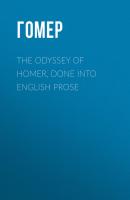The Odyssey of Homer, Done into English Prose. Гомер
Чтение книги онлайн.

Читать онлайн книгу The Odyssey of Homer, Done into English Prose - Гомер страница 21
Название: The Odyssey of Homer, Done into English Prose
Автор: Гомер
Издательство: Public Domain
Жанр: Зарубежная классика
isbn:
isbn:
It was the fourth day when he had accomplished all. And, lo, on the fifth, the fair Calypso sent him on his way from the island, when she had bathed him and clad him in fragrant attire. Moreover, the goddess placed on board the ship two skins, one of dark wine, and another, a great one, of water, and corn too in a wallet, and she set therein a store of dainties to his heart's desire, and sent forth a warm and gentle wind to blow. And goodly Odysseus rejoiced as he set his sails to the breeze. So he sate and cunningly guided the craft with the helm, nor did sleep fall upon his eyelids, as he viewed the Pleiads and Bootes, that setteth late, and the Bear, which they likewise call the Wain, which turneth ever in one place, and keepeth watch upon Orion, and alone hath no part in the baths of Ocean. This star, Calypso, the fair goddess, bade him to keep ever on the left as he traversed the deep. Ten days and seven he sailed traversing the deep, and on the eighteenth day appeared the shadowy hills of the land of the Phaeacians, at the point where it lay nearest to him; and it showed like a shield in the misty deep.
Конец ознакомительного фрагмента.
Текст предоставлен ООО «ЛитРес».
Прочитайте эту книгу целиком, купив полную легальную версию на ЛитРес.
Безопасно оплатить книгу можно банковской картой Visa, MasterCard, Maestro, со счета мобильного телефона, с платежного терминала, в салоне МТС или Связной, через PayPal, WebMoney, Яндекс.Деньги, QIWI Кошелек, бонусными картами или другим удобным Вам способом.